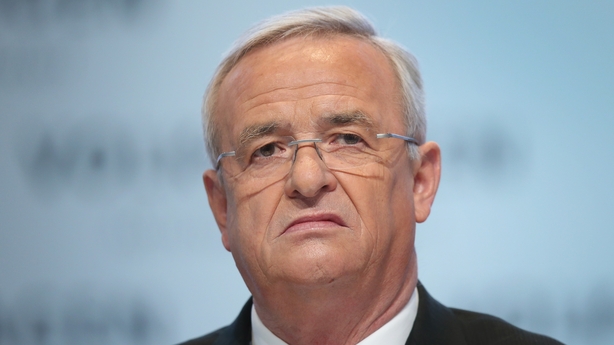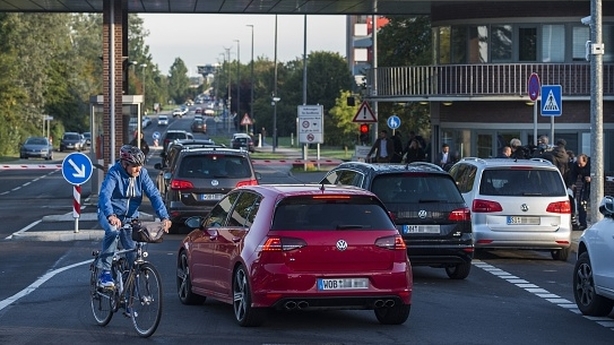Volkswagen Chief Executive Martin Winterkorn resigned this afternoon, taking responsibility for the German carmaker's rigging of US emissions tests.
"Volkswagen needs a fresh start - also in terms of personnel.
"I am clearing the way for this fresh start with my resignation," Mr Winterkorn said in a statement.
He said he was shocked by events of the past few days, above all that misconduct on such a massive scale was possible at the company.
A five-member executive committee had grilled the 68-year-old since morning at the company's headquarters in Wolfsburg, Germany.
The company was under huge pressure to take decisive action, with its shares down more than 30% in value since the crisis broke, and the bad news still coming.
German prosecutors said today they were conducting a preliminary investigation into the manipulation of vehicle emission test results at Volkswagen, while French Energy Minister Segolene Royal said her country would be "extremely severe" if its investigation into the firm found any wrongdoing.
US authorities are planning criminal investigations after discovering that Volkswagen programmed computers in its cars to detect when they were being tested and alter the running of their diesel engines to conceal their true emissions.
German Chancellor Angela Merkel had urged Volkswagen to move "as quickly as possible" to restore confidence in a company held up for generations as a paragon of German engineering prowess.
Germany's transport minister earlier rejected accusations that he had prior knowledge of the emissions control technology used by Volkswagen to rig test results.
"I have made it very clear ... that the allegations of the Greens party are false and inappropriate," Transport Minister Alexander Dobrindt told journalists.
"We are trying to clear up this case. Volkswagen has to win back confidence," he said, adding that the first he knew about the case was when he read it in a newspaper.
He said experts were now examining how to deal with the millions of cars with such devices.
"Volkswagen has said that this part is not active. The commission will now examine what kind of impact an inactive part can have on the engine. Afterwards, you can decide what will happen with these cars," he said.
Volkswagen's admission that some of its cars cheated clean-air tests in the US has led to calls for stricter testing in Europe.
 The German car-maker said 11 million vehicles worldwide might have been fitted with software to trick testers into believing they met environmental standards.
The German car-maker said 11 million vehicles worldwide might have been fitted with software to trick testers into believing they met environmental standards.
It is not known whether cars on Ireland's roads are affected - or how many of them - but campaigners abroad have demanded that the process for testing vehicles is made more stringent.
Tim Barlow, air quality expert at Britain’s Transport Research Laboratory, said Europe's laboratory system, which dates back to 1996, needs to be brought up to date.
He said: "Current testing methods are outdated and offer room for error or optimisation, so it's imperative that industry, governments and regulatory bodies work together to find the best way forward.
"Ideally we need to move towards a testing model that's based on real driving emissions, carried out with vehicles operated on normal roads.
"This should be followed up with in-use compliance testing, whereby a sample of vehicles already in use are tested to check they still comply with the emissions limits."
The US Environmental Protection Agency said cars had been fitted with sophisticated software to switch engines to a cleaner mode when they are undergoing official emissions testing.
This is a type of software known as a "defeat device". Once on the road, the cars produced nitrogen oxide pollutants at up to 40 times the legal standard.
Monique Goyens, director general of European consumer organisation the BEUC, said real-life testing was urgently needed on this side of the Atlantic too.
"We've been saying long before this scandal broke out that one of the problems in the EU, unlike in the US, is the absence of a surveillance system which would require independent on-the-road testing," she said.
"The EU needs to implement such a system to restore trust amongst consumers in emissions and fuel consumption test programmes."
Details of a real driving emissions test incorporating modern technologies and on-road conditions are being discussed by the industry and the European Commission.
It has been proposed that the test is introduced in 2017, but there have now been calls for it to be introduced as soon as possible in the wake of the VW scandal.
Meanwhile, the European Car Association (ACEA) has said it was taking the Volkswagen scandal "very seriously", but signalled it might be an isolated issue.
"There is no evidence that this is an industry-wide issue," ACEA said in a statement.

